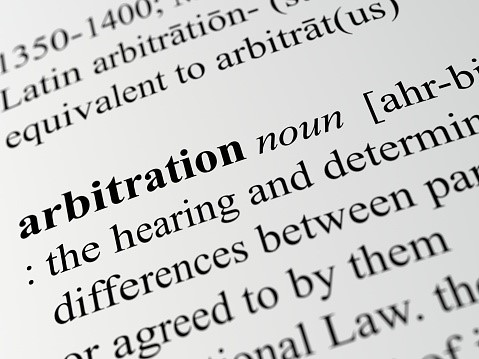
By Jaydin Jennings, Staff Writer
Why So Arbitral?
For years and across industries, employers have relied on the practice of forced employment arbitration to resolve legal disputes with their employees. The short answer to the question in the subheading is that employers prefer to sidestep the costs in money and time that being hauled into court would entail, e.g., the discovery process, the appeals process—and huge potential legal fees. Employers are also not fond of the public nature of having to litigate in any circumstances.
Arbitration is regarded as being cheaper and faster than the civil trial process and is mostly confidential, with no public records filed, settlements disclosed, or transcripts leaked that could later potentially damage a party’s reputation. While arbitration decisions are not generally public knowledge as stated, two separate New York Times articles on the topic suggest, respectively, that courts since 2010 have been granting employer requests for forced arbitration hearings more often than not and, as some people speculate, arbitrators may be incentivized to side with the employer party that likely has the means and foresight to keep them on retainer to resolve future disputes that arise.
Depending on the employer, employee claims against the company may be more commonplace than one-off, so it would not be a reach to see why an employer may want to keep one arbitrator for future disputes (aka “repeat playing”) as opposed to cycling through different arbitrators each time one’s services are required. Ultimately, the takeaway here is that arbitration generally saves employers more money and time than litigation does.
Background
This seeming employer status quo of alternative dispute resolution in lieu of traditional litigation was made possible by the Federal Arbitration Act (FAA). The FAA was enacted in 1925 to lay out the legal principles that U.S. arbitration follows.
If an employee and employer enter into a contract (often required for employment) with mandatory arbitration clauses—and the employment relates to interstate/foreign commerce or maritime transactions—that employee must submit to binding, contract-based, out-of-court adjudication to redress any grievances between him/her and the employer post-signature. So long as the contract, per 9 U.S. Code § 2, is considered to be “valid, irrevocable, and enforceable (except on legal or equitable grounds for the revocation of a contract),” and the decision is consistent with arbitration laws of the base jurisdiction and principles of fundamental fairness, the employer’s arbitration agreement is compulsory and the arbitrator’s award is final.
Under such terms, the employee, assuming he/she still wants the hypothetical job on the table, but dislikes alternative dispute resolutions, does not seem to have much of a choice other than to sign the contract and hope that there never comes a need to assert a claim against the employer, or take his/her job hunt elsewhere in search of a potential employer that does not believe in mandatory arbitration clauses. The latter may just well reap more of the same harvest. According to a 2018 study from the Economic Policy Institute, “[m]ore than half—53.9 percent—of nonunion private-sector employers have mandatory arbitration procedures. Among companies with 1,000 or more employees, 65.1 percent … [and] [a]mong private-sector nonunion employees, 56.2 percent …” which is to say that a good majority of Americans have not been able to escape arbitration mandates in the workforce assuming they tried to at all, and that majority has only continued to grow.
However, there now exists a legal exception to this normalized business practice that, while arguably not a fix-all, may help certain aggrieved parties receive a better chance at justice where applicable.
The New Law
On March 3, 2022, President Biden signed federal legislation into law to amend the FAA. This new law, the Ending Forced Arbitration of Sexual Assault and Sexual Harassment Act (EFASASHA), states the following:
Notwithstanding any other provision of this title, at the election of the person alleging conduct constituting a sexual harassment dispute or sexual assault dispute, or the named representative of a class or in a collective action alleging such conduct, no predispute arbitration agreement or predispute joint-action waiver shall be valid or enforceable with respect to a case which is filed under Federal, Tribal, or State law and relates to the sexual assault dispute or the sexual harassment dispute.
The EFASASHA ensures that individuals who allege that they were sexually assaulted or sexually harassed after March 3, 2022, are not bound by any preexisting arbitration agreement or waiver with employers to proceed to arbitration. Also, these employees are not barred from bringing their claims as collective actions if they so choose. This amendment can put victims of sexual harassment and assault in a better position to choose arbitration voluntarily or to litigate their claims in court—but at any rate, employees now are free to express choice in the matter rather than be compelled to choose. Of note, the new act does not apply to claims of discrimination or claims of harassment based on other protected classes such as race, religion, national origin, etc.
What Is to Come?
Commenting on the EFASASHA and on related goals for the future, President Biden remarked in the Statement of Administrative Policy that the Biden Administration “looks forward to working with the Congress on broader legislation that addresses these issues as well as other forced arbitration matters, including arbitration of claims regarding discrimination on the basis of race, wage theft, and unfair labor practices.” Not so great news for employers, but certainly something all employees should know about.
Staff Writer Jaydin Jennings is an incoming third-year law student at Rutgers Law School-Newark with an interest in intellectual property law and civil rights law. He also teaches at C2 Education.

